Russian Imperial Academy of Medicine Head Surgeon to Emperor Alexander II medal
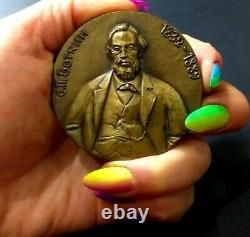
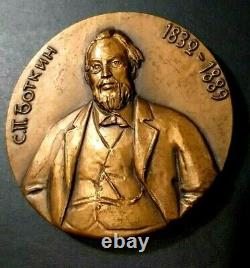
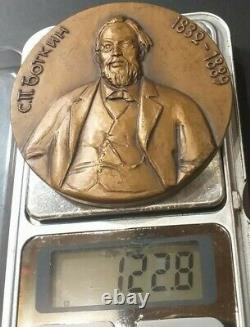
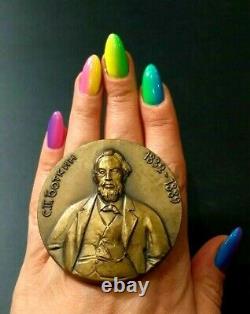
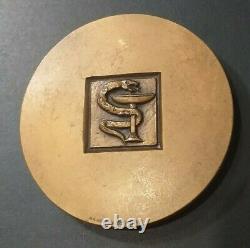

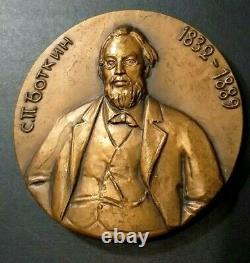

5 September 1832 - 12 December 1889 was a famous Russian. Clinician, therapist, and activist, one of the founders of modern Russian medical science and education. Diagnostics into Russian medical practice. Botkin was born on 5 September 1832, in Moscow to a family of famous Russian tea tradesmen, and the son of Anna Ivanovna (Postnikova) and Petr Kononovich Botkin.
He made his first steps towards education in the private school of Ennes. In 1850 Botkin was admitted to Moscow State University. In 1855 Sergey Botkin graduated from the university with honors and received a Doctor of Medicine degree.
Shortly afterwards however he was mobilized as a conscript, designated to serve as military surgeon and sent straight to Sevastopol. There Botkin worked under the guidance of Nikolay Pirogov. Widely recognized as a pioneer of field surgery. The treatment of wounded combatants on the spot and in spite of ongoing hostilities as the situation may warrant. Pirogov is known for performing the first operation under anesthesia. On the battlefield at the time. Upon the end of his military service, Botkin received a flattering review from his supervisor.He subsequently went abroad, seeking to improve his skills and was able to gain valuable professional experience working at some of the most prestigious institutions on the continent. Upon his return to Russia, Botkin was invited to work with professor Shipulinsky in the Academy of Medicine and Surgery, and the following year Botkin took Shipulinsky's position at the age of 29. He was the first to suggest that catarrhal jaundice hepatitis.
Was caused by an infection. In early 1860s, Botkin was assigned as an advising member of the medical board of the Imperial Ministry of Internal Affairs. In 1873 he was also made Head Surgeon to the Emperor, having been among the court physicians for both Tsar Alexander II.Furthermore, the same year he was elected president of the Medical Association of St. In 1886, Botkin headed the National Public Health Commission, created to investigate the unusually high mortality rates. Prevalent in Russia, both in times of peace and war. Botkin was married to A.
Krylova, relative of Alexey Krylov. Was a prominent writer and his brother Mikhail. Was a painter and well-known art collector. Was murdered with Nicholas II.
And the Tsar's family July 16/17, 1918 by the Bolsheviks. Sergey Petrovich Botkin died on 12 December 1889, in Menton, France, from liver disease, which was complicated by a heart ailment. In December 1920, marking the tenth anniversary of the Soldatenkovskaya Hospital.The Moscow Council decided to rename it the S. The Aleksandrovskaya barrack hospital St. Petersburg has been named after S. Botkin since 1891 now the S. Botkin Clinical Infectious Diseases Hospital.
By the decree of the Administration of the city of Orel No. 2335 of September 11, 2001, the city medical association was named after SP Botkin (until 1995 - the medical and sanitary unit of the Oryol Steel Rolling Plant). Since 1872, the first city cemetery has been functioning, located on Botkin Street, known as the Botkin Cemetery. In 1898, in memory of the outstanding physician's merits, Samarskaya Street in St. In 1957, a memorial plaque (architect: MF Egorov) was installed on the house number 20 with the text: The outstanding Russian scientist in the field of medicine Sergey Petrovich Botkin worked here from 1861 to 1889.
Botkin wears one of the streets in Mogilev. Erected in the park in front of the clinic at the corner of Botkin Street. In the 1920s, a bust by I. Was installed on the territory of the Botkin Hospital. A memorial plaque architect: L. Robachevskaya was installed at the house at 77 Galernaya Street in 1958 with the text: "Sergey Petrovich Botkin lived and worked here from 1878 to 1889 for the glory of Russian medicine".In February 1921, the Petrograd Society of Physicians named after V. Dedicated to SP Botkin the fourth part of his poem Who Lives Well in Russia? "(" A Feast for the Whole World). Botkin is named one of the planes 320. Located in the Russian Museum.
Monument to Botkin in the park in front of the Faculty Therapy Clinic. The grave of Sergei Petrovich Botkin at the Novodevichy cemetery in St.
This item is in the category "Coins & Paper Money\Exonumia\Medals". The seller is "top-art-medals" and is located in this country: IL. This item can be shipped worldwide.
